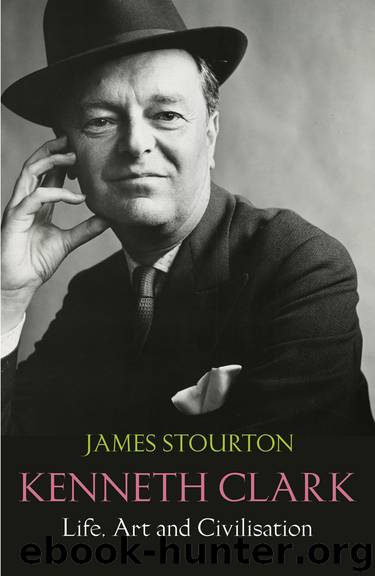Kenneth Clark by James Stourton

Author:James Stourton
Language: eng
Format: epub
Publisher: HarperCollins Publishers
Published: 2016-07-28T16:00:00+00:00
Clark always proclaimed that, apart from his family, he had no loyalties except to the Royal Opera House, Covent Garden. This was the committee that gave him the most pleasure both in terms of what it instigated, and from its increasingly impressive results: Covent Garden turned into the home of one of the great opera and ballet companies of the world. Clark’s support had begun with Sadler’s Wells Ballet in the 1930s, and by 1940 he was guaranteeing the company to the tune of £500 a year.26 At the end of the war the question arose of the future of the Covent Garden theatre, which was being used as a dance hall. The music publishers Boosey & Hawkes had acquired a short lease, and in the absence of CEMA’s chairman Maynard Keynes, who was attending the post-war economic conference at Bretton Woods, called on Clark in his role as vice-chairman. They asked if CEMA might support a season of opera at the theatre, but, with echoes of his response to Myra Hess at the National Gallery he said, ‘No; we will take on Covent Garden altogether.’* Clark’s decisive action, followed by strong advocacy to the Treasury from Keynes, transformed the fortunes of Covent Garden and led to the creation of the Royal Ballet and Royal Opera Companies. A trust was established, with Keynes as chairman and Clark as a prominent member (he would later become vice-chairman).
The Royal Ballet was a relatively simple matter to bring to life: the new board persuaded Ninette de Valois and the Sadler’s Wells Company to change its name and to make Covent Garden its home. De Valois became a close friend to Clark, to whom she would always bitterly complain that the Royal Ballet was treated like a poor relation of the opera company.* Its opening night on 20 February 1946 was Oliver Messel’s production of Sleeping Beauty, with Margot Fonteyn and Robert Helpmann performing in front of the King and Queen. The only thing that marred the occasion was that as the curtain rose, Keynes was taken ill – he was to die two months later.
After a faltering start, the vastly more expensive Royal Opera Company eventually took off, heralding a golden era of British opera, with important work coming from Vaughan Williams, Benjamin Britten, Michael Tippett and Lennox Berkeley. Clark’s personal taste in opera was catholic: he loved Mozart and Verdi – he would start his children on the former so as not to spoil their ear – and Britten. Not sharing Jane’s passion for the Norwegian soprano Kirsten Flagstad singing Isolde, he discovered a chaise longue at the back of the royal box which he told his secretary was the ideal place to recline and listen to Wagner.27
The immediate problem was finding someone to run Covent Garden, and Clark put forward David Webster to become the general administrator. They had met in Liverpool, where Webster, who ran the city’s philharmonic orchestra, had impressed Clark with his knowledge and energy. Other names were
Download
This site does not store any files on its server. We only index and link to content provided by other sites. Please contact the content providers to delete copyright contents if any and email us, we'll remove relevant links or contents immediately.
The Secret History by Donna Tartt(16627)
Red Sparrow by Jason Matthews(4668)
Harry Potter 02 & The Chamber Of Secrets (Illustrated) by J.K. Rowling(3292)
In a Sunburned Country by Bill Bryson(2948)
Figure Drawing for Artists by Steve Huston(2799)
The Daily Stoic by Holiday Ryan & Hanselman Stephen(2709)
Drawing Cutting Edge Anatomy by Christopher Hart(2678)
The Roots of Romanticism (Second Edition) by Berlin Isaiah Hardy Henry Gray John(2568)
Japanese Design by Patricia J. Graham(2556)
Make Comics Like the Pros by Greg Pak(2423)
Stacked Decks by The Rotenberg Collection(2270)
Harry Potter and the Deathly Hallows (7) by J.K. Rowling(2215)
On Photography by Susan Sontag(2131)
Draw-A-Saurus by James Silvani(2105)
Tattoo Art by Doralba Picerno(2083)
Foreign Devils on the Silk Road: The Search for the Lost Treasures of Central Asia by Peter Hopkirk(2056)
Churchill by Paul Johnson(2013)
The Traveler's Gift by Andy Andrews(2012)
Drawing and Painting Birds by Tim Wootton(2001)
